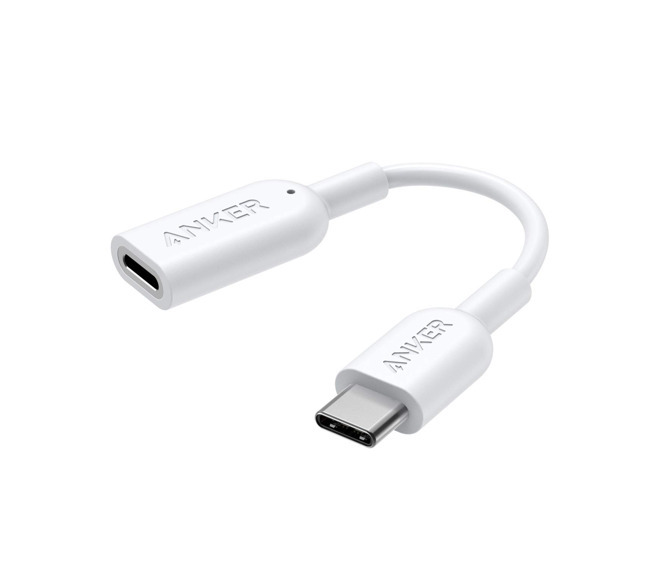Apple adds Lightning-to-Ethernet, audio Lightning-to-USB-C adapters to MFi program
Apple this week announced expansions to its MFi program, informing third-party manufacturers of standards authorizations for new adapters including LAN cables with support for Power over Ethernet (PoE) technology.
 Anker's USB-C to Lightning audio adapter.
Anker's USB-C to Lightning audio adapter.
Members of the MFi program were made aware of the changes in Apple's "MFi Accessory Interface Specifications Release R31," which outlines support for new adapter types compatible with iOS devices, reports Mac Otakara.
Listed among the new additions are Lightning-to-Ethernet adapters. Belkin's Ethernet + Power Adapter with Lightning Connector is an example of a product in this category to retain MFi certification and is currently available through Apple's online storefront, among other retailers.
The MFi authorization includes adapters that support PoE technology, meaning users can charge their iOS device directly through an Ethernet cable when an enabled connection is available. Users tapping into legacy Ethernet connections without PoE require a separate Lightning cable to provide power to their device.
According to the report, Apple has whitelisted Realtek's RLT8111EPU Gigabit Ethernet controller for the MFi program.
In addition, Apple is designating an MFi certification for Lightning-to-USB-C audio adapters. Anker, for example, launched an MFi audio adapter that enables MacBook, iPad Pro and Windows PC users the ability to connect Lightning headphones over USB-C. Other accessory makers have yet to follow suit.
The freshly outlined MFi standards are expected to result in a wider selection of Lightning-to-Ethernet and Lightning-to-USB-C audio adapters in the coming months.
 Anker's USB-C to Lightning audio adapter.
Anker's USB-C to Lightning audio adapter.Members of the MFi program were made aware of the changes in Apple's "MFi Accessory Interface Specifications Release R31," which outlines support for new adapter types compatible with iOS devices, reports Mac Otakara.
Listed among the new additions are Lightning-to-Ethernet adapters. Belkin's Ethernet + Power Adapter with Lightning Connector is an example of a product in this category to retain MFi certification and is currently available through Apple's online storefront, among other retailers.
The MFi authorization includes adapters that support PoE technology, meaning users can charge their iOS device directly through an Ethernet cable when an enabled connection is available. Users tapping into legacy Ethernet connections without PoE require a separate Lightning cable to provide power to their device.
According to the report, Apple has whitelisted Realtek's RLT8111EPU Gigabit Ethernet controller for the MFi program.
In addition, Apple is designating an MFi certification for Lightning-to-USB-C audio adapters. Anker, for example, launched an MFi audio adapter that enables MacBook, iPad Pro and Windows PC users the ability to connect Lightning headphones over USB-C. Other accessory makers have yet to follow suit.
The freshly outlined MFi standards are expected to result in a wider selection of Lightning-to-Ethernet and Lightning-to-USB-C audio adapters in the coming months.

Comments
”-Nooooo! You are supposed to be creating new proprietary ports - not making standard and useful ones!”
Plug it into a MBP and you can use Lightning headphones with it? Charge the Apple Pencil? Charge the MBP with a Lightning to USBC cable and USBC charger?
What other use cases?
You could use it to connect Lightning headphones. Potentially use a USB to Lightning cable to charge the pro.
The MFi program is so unreliable that the company who sells your cable is probably not the one who made it. Also a lot of MFi licensees have sold their name to non MFi companies.
I found this out a few years ago when I purchased a MFi lighting cable from a MFI licensed seller on Groupon. I was using a 12 watt charger and plugged it into an iPhone 5s. When I finished charging, I unplugged it from the phone and left the cable on the floor still plugged into the charger, and the lightning cable was laying on the carpet. I came back hours later to find out that the lightning end had melted its plastic sheathing.
I emailed the company to confirm they were a MFi licensed company and they replied they were and asked how I was using the cable. When I explained how I was using it, they had the nerve to tell me that the iPad charging block that I was using was moving too
many watts through the cable and that’s why it melted. I showed them the article on Apple’s website that said you can use an iPad charger to charge an iPhone without any damage.
The seller offered to replace the cable, but I was weary and just got a refund instead.
I called Applecare to inquire if they knew who was and was not a MFi licensee and they said they have no idea and there was not a list for them to refer to. So you are going by the packaging which just shows a MFi logo, you can’t be sure if it’s legitimate or a counterfeit cable.
You can try using this:
https://mfi.apple.com/MFiWeb/getAPS.action
But sometimes the company selling the cable isn’t the one with the license nor the one who made it, so there’s no real way to tell if it’s legitimate or not.